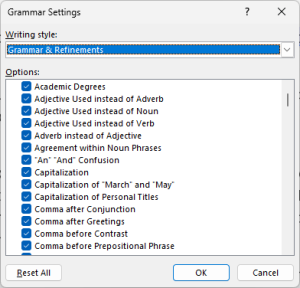A prototype of this post originally appeared on LinkedIn.
Today I was using Microsoft Word, and for the first time I took a look at a feature that’s probably been there for a long while.
Also today, there’s at least one more LinkedIn poll with an interview question — apparently aimed at testers — on a fairly trivial aspect of Java programming.
Questions of that nature might reasonable if the interviewer’s goal is to hire a Java programmer, and to sift out the novices from the veterans. They might be reasonable if the intereviewer wants a toolsmith — someone is going to write Java code to support testers.
But such questions are very poor ways to assess testing skills. If you’re a tester, beware of them; your prospective employer may be have a trivialized model of testers and testing work. The interview question may be revealing that you won’t be a good fit if you’re ambitious to test software.
It seems to me that for people who want a tester, a much better approach would be to present this dialog:

Then ask: “How would you test the functions presented in this dialog? Where might you start? How might you use code or tools — whether you or someone else created them, in whatever language — to help you?”
Of course, this requires the interviewer to have some capacity for assessing and evaluating testing and skills and tactics related to doing it well. This document might be of some help.
Well, the first thing I’d do is reach up to my bookshelf and pull down my English book. I’d dust it off, open it up, and skim through to see if some of the multitudes of options listed by Word might be covered. Then I’d stop and think for a moment and probably log into some online retailer and see if there was an updated book.
After scrolling for a minute, I’d realize that maybe I’d try to get Word to be an oracle for me and tell me which grammar sources it uses. I’d maybe open up Word, go to the help and then laugh at myself for even thinking that that information would be readily available from there. While I had Word open, I’d look through the list of functions myself and raise my eyebrows at items like “Jargon” and “Geopolitical References”. Then I would probably take a deep breath, open up my RST resource documents (among others) and get to work.
I’ve been on both sides of the interview on this one. Most recently, when I was asked this in an interview and I essentially ended that I’d pull from resources like RST to help with my blind spots, and then explained RST, it seemed that went over well (I got the job). Likewise, if someone indicated they would use resources such as RST or could explain other resources that provide sensible, reasoned, and detailed frameworks from which they could apply to the task — well, that would be a winner in my book. We need people that think, ask questions, and develop their testing skills. Also, we have to be sure we don’t blindly follow any school of thought when we use resources – but think critically about them and make sure we apply the right resource/tool for the job.